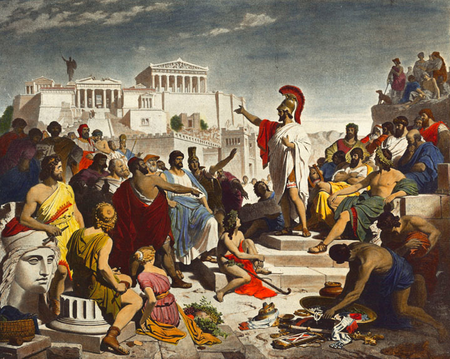by MUBARAK ALI

The art of rhetoric requires complete command over the use of language, and techniques to make speeches more appealing by quoting suitable verses and the sayings of renowned scholars. Speakers must pay attention to how they can charm their audiences with their voice and body language.
This art flourished in democratic Athens where politicians often addressed citizens at gatherings to win their favour. A group of scholars, known as sophists, used to train the sons of aristocrats in the art of rhetoric so they would be able to participate in politics and fluently express their political manifestos to win people’s support.
In this democratic setting, Athens produced great orators who had the ability to capture the attention of the audience and gain full support for their points of view. Pericles, who was a leader and a fiery speaker of democratic Athens, delivered a famous funeral oration in honour of those Athenians who were killed in the Peloponnesian War, which was fought between Athens and Sparta.
He delivered this speech at a sombre gathering where the relatives of great soldiers were present. It was a rare occasion when women also participated in the gathering. Pericles spoke patiently, eulogising bravery and the spirit of nationalism, which inspired them to sacrifice for the Polis. Greek historian Thucydides has mentioned the full text of Pericles’ oration.
Demosthenes was another great orator, who initially used to stammer. In order to deal with this problem, he put pebbles in his mouth and practised speaking without a pause near the seashore. With time, he emerged as one of the greatest orators of his time.
When Philip of Macedonia invaded Athens, Demosthenes resisted his invasion. He mobilised people by addressing public gatherings and urging people to not recognise Philip’s rule. He also spoke against Alexander and the occupying army of Macedonia. When the army tried to capture him, he committed suicide and died as a patriotic leader.
The art of rhetoric also held sway during the Roman Empire as there were several republican institutions, especially the senate, where political affairs were discussed. Senators participated in these discussions and used their skills as good orators to convince other senators to adopt their policies.
After the assassination of Caesar, Cicero – who was a fiery speaker – spoke against Mark Antony, a close friend of Caesar. Mark Antony was deeply infuriated and ordered his subordinates to kill Cicero. This was the price Cicero paid for freedom of speech.
The importance of rhetoric declined after the fall of the Roman Empire and during the rule of kingship, which ended the role of public assemblies. England was perhaps the only country where institutions such as parliament retained freedom of speech and parliamentarians – who were mostly feudals – presented their demands.
Thenews for more
